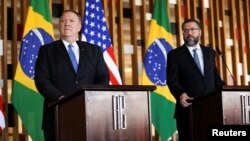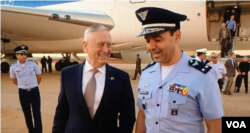The United States and Brazil have negotiated an accord to safeguard U.S. space technology the South American nation hopes will be used in commercial rockets lifting off from its launch site near the equator, the Brazilian government said on Monday.
The agreement is being wrapped up in time to be signed next week during a visit to Washington by President Jair Bolsonaro.
"Negotiations are being concluded with a view to signing an agreement during the presidential visit to Washington," a foreign ministry official said.
Brazil hopes to get a piece of the $300 billion-a-year space launch business by drawing U.S. companies interested in launching small satellites at a lower cost from the Alcantara base run by the Brazilian Air Force on the South American country's north coast.
Because of its location close to the equator, launches burn 30 percent less fuel and rockets can carry larger payloads, though Brazil is aiming for the cost micro-satellite niche market that is growing fast, Air Force officers said.
Space cooperation between the United States and Brazil took a big step forward when they signed a Space Situational Awareness (SSA) agreement last year during a visit to Brasilia by former U.S. Defense Secretary James Mattis.
The accord on sharing real-time tracking data on objects and debris in space is needed to develop a satellite launching business without the risk of collision.
In December 2017, Boeing and Lockheed Martin visited the Alcantara space center, which is especially attractive to smaller firms, such as Tucson, Arizona-based rocket-maker Vector Launch Inc because of its location.
But without the technology safeguard agreement (TSA) that protects sensitive American space launch and satellite technology, no U.S. rocket could blast off from Brazil.
A previous attempt at a U.S.-Brazilian space partnership was scuttled in 2003 when the TSA ran into resistance from the leftist government of former president Luiz Inacio Lula da Silva and was thwarted by Brazilian lawmakers.
It floundered because U.S. unverified access to the Alcantara base was not acceptable to Brazilian politicians on sovereignty grounds.
The TSA is seen by Washington as opening opportunities for greater cooperation in aerospace and defense between the two countries.






